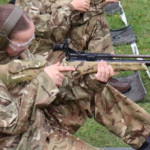ForcesWatch
ForcesWatch investigates and raises awareness about militarism in the UK, with a focus on civil society and young people.
Our work contributes to the development of sustainable and human-centred security, and a future where the harms of militarism have less impact on our world.
Our concerns
The military is a powerful state institution and employer in the UK which is often insulated from criticism and public scrutiny. Enormous damage is done to all those caught up in armed conflict (civilians and combatants), and there are unique risks, obligations and rights issues faced by serving personnel. It is therefore vital that there is critical debate about the military, its recruitment practices and its operations.
The UK military works very closely with the defence industry, including some of the largest arms companies in the world. Much of our work looks at how these two parts of the UK's defence establishment work in tandem.
Our work follows two themes. Challenging military harm - looking at the many ways in which military institutions and mindsets are harmful to individuals and communities. Demilitarising the future - developing understanding of how we can collectively decrease the influence and impact of state and state-sanctioned violence. The military and defence industry will not solve the problems we face as a society.
What we do
- Research and analysis
- Publishing reports, resources, comment and analysis articles, and the Warrior Nation podcast
- Raising awareness and debate
- Supporting others to challenge military influence on young people and wider society
We currently work to raise awareness in the following areas:
Military and defence industry engagement with young people
The UK armed forces visit thousands of schools and youth activities each year with activities aimed at promoting the interests of the military and long-term recruitment. For the past decade the Department for Education has promoted ‘military ethos’ programmes such as cadet units in state schools. The armed forces and the defence industry - including some of the world's largest arms companies - are increasingly involved in the provision of STEM (science, technology, engineering and maths) education and activities for young people. See more here
Military recruitment age, service justice and other forms of military harm
The UK is the only country in Europe that recruits 16 year olds into the armed forces and currently one quarter of British Army recruits are under 18. Much of our early work focused on campaigning to raise the minimum age of recruitment to 18 years. We have also raised concerns about terms and conditions for serving personnel, lack of recognition of ethical issues associated with military service and conscientious objection, as well as duty of care, equality and health concerns related to military recruitment and service. As well as monitoring recruitment practices, we currently support the work of partner organisations on the impact of recruitment on the youngest recruits, and support those raising wider concerns about the impact of military culture on service personnel, the military justice system, and unfair terms and conditions. See more here
The influence and normalisation of military in society
We respond to ways in which the military is promoted as a normal part of everyday life, monitoring policies and initiatives which aim to instil uncritical national pride in the armed forces and public support for overseas interventions. Unquestioning support for the military stifles concerns about how young people are recruited and limits debate on alternatives to war. Our current work on the influence of military interests (armed forces and the defence industry) on the UK parliament expands on our previous work around militarism's impact on democratic institutions and public space. See more here
Military power in British democracy
A consensus in Westminster on defence issues is failing to properly scrutinise the impact of the armed forces, the arms industry, defence partnerships and novel military tech initiatives on society. We’re investigating points where the military and defence industry leverage undue influence, with implications for democracy, war and security in the UK. See more here
Our values
Enormous damage is done to all those caught up in armed conflict. It is, therefore, vital that there is wide critical debate about the military and its recruitment practices. This concern underpins our work.
ForcesWatch is committed to:
- respect for all people, including those we disagree with
- honesty in how we approach and present the issues
- fostering critical awareness of the issues among the public and ourselves
- including and involving a diversity of people, including a range of views and skills
Who we are and how we are funded
ForcesWatch is a non-profit organisation established in 2010. We incorporated as a company limited by guarantee in 2025.
We are a small team of paid and freelance staff and our work is overseen by a steering committee.
We are funded by grants from trusts and by donations from individuals.






